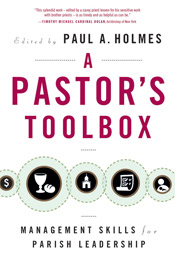 |
| A Pastor's Toolbox: Management Skills for Parish Leadership, ed. by Paul A. Holmes (Liturgical Press, 2014, 190 pp., $20). |
Just as I was transitioning back to being a pastor after eight years in diocesan administration, I began reading A Pastor’s Toolbox. That’s providence! This volume is an outgrowth of the National Leadership Roundtable on Church Management, and the authors of its various chapters originally presented their material in workshops sponsored by the roundtable and Seton Hall University. Lilly Endowment Inc. provided financial support for the workshops and the volume.
Pastor’s Toolbox includes 15 essays that cover various aspects of parish leadership and apply management tools and skills from both the for-profit and not-for-profit sectors. While developed for and primarily addressed to Catholic priests who are preparing to be first-time pastors, the authors’ approaches and insights are mostly applicable to pastors of other denominations as well — and even for people like me who are returning to parish ministry after work in another apostolate.
The writers approach the work of pastoral leadership with the assumption that pastors need management skills to lead and oversee parish staffs both large and small. Topics include pastoral leadership, human resource management, facilities management, financial analysis and control, utilization of councils, pastoral planning, cultural diversity, leadership in mission-driven churches, and stewardship of resources. Bookending the presentations on management skills are helpful essays on the theology of management and healthy self-care for the pastor.
As with any volume of collected essays, readers will find a certain unevenness among the various chapters, but the maxim that less is more seems to apply. Some of the briefer essays, such as Robert Staggs’s on pastoral leadership and Kerry Robinson’s on fundraising as Christian stewardship, are absolute gems. The longer essays, which go into considerable detail, might be more profitably scanned at first reading and then referenced later as needed.
Seminary leaders would do well to recognize students need this kind of education alongside the core theological disciplines. The pastor’s duty to manage the congregation’s goods and temporal interests is not dissimilar from that of householders to care for their own household property for the good of their family, regardless of their trade or profession. The responsibility for the administration of the congregational household has persisted from the earliest days of the church, but it has become increasingly complex over the centuries. Competence in theological wisdom and spiritual leadership does not excuse pastors from the responsibility of providing for their flock, even including the task of fundraising.
In years past, learning administrative responsibilities and skills for pastoral leadership was accomplished through an informal apprenticeship as individual members of the clergy served as associates under experienced veterans. Depending on the skills and teaching abilities of the veteran pastor, the apprenticed assistant acquired either strong or weak skill sets — and good or bad habits.
But contemporary congregations’ and modern society’s expectations for transparency and accountability on the part of their leaders require a far more sophisticated grasp of managerial responsibilities than pastors faced previously. While the pastor need not become an expert in every area of organizational management, the pastor does need to be sufficiently knowledgeable to oversee and lead the enterprise. Even more, the pastor needs to be humble enough to seek counsel, and informed enough to know where to find the assistance needed to carry out all the functions of pastoral leadership.
It is these last two areas in which seminaries and theological schools should be particularly well positioned to prepare future pastors. One course toward the end of their seminary studies would go a long way toward equipping future pastors with the framework for appreciating this aspect of their calling. Presented in the appropriate spiritual context, it would provide them with the balance of humility and confidence to assume these responsibilities when they come their way.